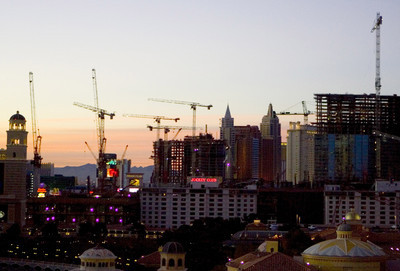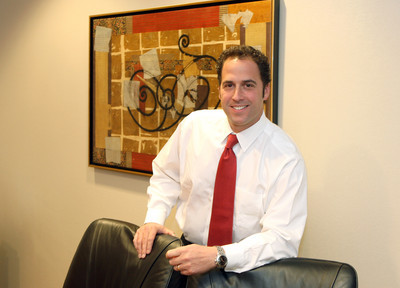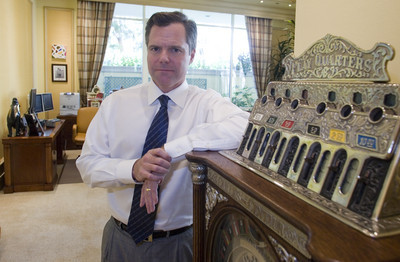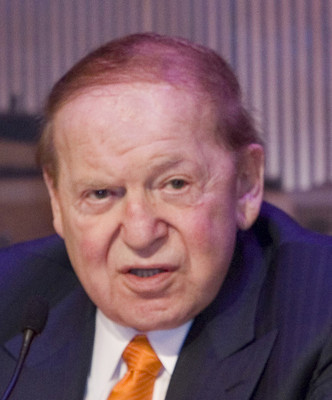The R Word
(Editor's note: This is the first of two stories)
In case you haven't heard, there's a recession coming.
Or maybe it's started already.
Or maybe it's just one of those things that you see in newspaper headlines or hear on TV.
While analysts debate the if, when and whether of a recession, a bartender inside a restaurant at a locals casino had his own economic outlook.
Although the bar was packed on Monday night following the Super Bowl, other nights are not what they used to be.
"These must be the winners," he said, referring to the crowd after the upset win by the New York Giants in Super Bowl XLII. He said that while people were out that night, he hasn't been seeing much celebrating recently.
The bartender, who asked that his name not be used and who has tended his post for nearly five years, said that there has been a noticeable decrease in customer traffic during the past year.
Even with only one bartender where there used to be two, he said tips have decreased slightly from last year.
The nongaming bar has also been hurt by the new smoking ban.
"People used to sit here longer when they could smoke," he said. "They'd watch the games, talk with friends. Now, they stop by if they are waiting for a table (in the restaurant). Otherwise, they just don't sit as long."
The bartender's view contrasted with that of Bill Lerner, gaming analyst for Deutsche Bank. He referred to current conditions as a slowdown and said this one differs from other economic slowdowns because it is happening with the confluence of three factors. He called it a consumer-led slowdown that is being compounded by consumer concerns over the housing crisis and investors' lack of confidence in the stock markets.
"Much of the public is under the impression that we are in recession, but I don't think we formally are," Lerner said.
Nevertheless, he said the slowdown will affect all Las Vegas gaming operations -- from the biggest high-end resort to the smallest corner casino.
"You might still have customers showing up," Lerner said. "The volumes might not reflect weakness, but their gaming budgets might. They might still be coming but playing less."
The recession will likely manifest itself in the low-end consumer, first hitting locals casinos and weekend travelers from California.
But the high-end market will not be immune either because of the stock market's continued volatility.
The next few weeks, as gaming companies release fourth-quarter earnings reports, will tell the extent of the economic slowdown, Lerner said. So far, only a few companies, including Las Vegas Sands Corp., which owns The Venetian and the Palazzo, and Wynn Resorts Ltd., have reported earnings.
An important gauge of the recession's current effect will be visible when the area's two largest locals casino operators, Station Casinos and Boyd Gaming Corp., report fourth-quarter earnings in the upcoming weeks.
USING THE 'R' WORD
A small-business owner is equally hesitant to use the "r" word.
"I hate to say the 'r' word, but I do believe we're in the beginning of a recession," said Kathy Gillespie, owner of A&B Printing and Mailing.
Business at A&B is off between 5 percent and 7 percent since mid-December, and the stream of customers into the printing shop's offices is more sporadic than normal, Gillespie said.
Orders from home builders have crashed, as requests for printed brochures, floor plans and upgrade lists have evaporated. That's not surprising considering the languor besetting the housing market with its tumbling sales and free-falling median prices.
But A&B's flagging sales suggest that economic weakness has spread to sectors unrelated to real estate, Gillespie said.
Doctors, dentists, janitorial services, electricians and plumbing companies all buy fewer press runs these days. Medical practices that used to commission 1,000 billing envelopes a month might now ask for just 500 envelopes a month.
"People who have been laid off or lost their jobs aren't going to the doctor or the dentist," she said. "And people who have plumbing problems or need to make other home repairs are going to Home Depot and buying supplies to fix things themselves."
One client segment thus far seems largely untouched. Tourist-oriented companies, including casinos and airlines, continue to request big numbers of promotional materials.
The drop in overall business has forced A&B to pare its 42-person staff by 21/2 positions. Gillespie is also hiring out less janitorial work. When her full-time employees don't have any print jobs to run, she'll ask them to sweep, change light bulbs and swap out air filters.
Nevertheless, Gillespie expects A&B to survive the downturn, which she said could last a year or so.
A&B's sales grew in the year following the Sept. 11, 2001, terrorist attacks, going from $1.2 million to $2 million. The company boosted its results through heavier investments in advertising and sales. Now, at $5.5 million in annual revenue, A&B's budget calls for a 10 percent gain in sales in 2008 -- a goal Gillespie aims to achieve through similar sales and marketing efforts.
"At this point, I'm being an optimist," she said. "I have to be an optimist. We have a philosophy of 'grow or die.'"
At another small business, the Las Vegas accounting firm Piercy Bowler Taylor & Kern, executives are seeing mixed signals.
Sales are up at the company, shareholder Ralph Piercy said, and employee counts have risen from the low 70s a year ago to the low 80s today. The company doesn't see signs of pain for clients outside the real estate sector, Piercy said. What's more, the state's gaming revenue and the city's visitor volume continue to climb.
Principal Kathleen Nylen said her appraisal work on large commercial projects keeps her "as busy as ever."
But both Piercy and Nylen see cause for concern.
The office market has growing vacancies thanks to the demise of mortgage companies and belt-tightening among title companies. And loans are much tougher to get these days, even for commercial borrowers with good credit and sound projects.
"The pendulum is maybe swinging too far to the other side (of the easy-credit boom)," Nylen said.
Neither Nylen nor Piercy said they could predict a recession, but Piercy noted that Las Vegas has always come late to nationwide recessions, and left downturns behind more quickly.
"The Las Vegas economy kind of masks the impact of a recession, because our economy is relatively strong," he said.
CONVENTIONAL WISDOM
In the convention and trade show industry, economic indicators are beginning to look a lot like 2002 -- but that's not necessarily a bad thing.
From 2001 to 2004, the number of convention delegates in Las Vegas annually increased 14 percent to 5.7 million from 5 million.
The increase in the post-Sept. 11 years was greater than the 11.4 percent increase from 1997 to 2000.
"Las Vegas tends to benefit as a convention destination during economic weakness," said Heidi Genoist, senior editor of the industry magazine Tradeshow Week. "It is an affordable destination in terms of what you get from it."
Since 2001, Las Vegas has also grown more dependent on conventions and trade shows. Although the number of convention delegates has increased 26 percent from 2001 to 2006, the amount of money those delegates pump into the local economy jumped 41 percent from $5.8 billion to $8.2 billion annually.
Whether conventions and trade shows can carry Las Vegas through another slump remains to be seen.
There's already evidence some show organizers are fed up with double-digit percentage increases in room rates.
Organizers of the International Consumer Electronics Show -- the biggest annual convention in North America -- say high costs threaten their event's viability. Another show, the winter sports convention held annually at Mandalay Bay, plans to move to Denver, where it's cheaper.
A dip in tourism would mean more empty hotel rooms and would lead to lower room rates for convention guests.
"That might be an area where we do see a correction in the economic downturn," Genoist said.
Las Vegas Sands Corp. Chairman and Chief Executive Officer Sheldon Adelson also believes the slowing economy won't affect the trade show and convention business.
During his company's recent quarterly earnings conference call with analysts and investors, Adelson was asked how the potential recession would hurt activity at the Sands Expo and Convention Center. Between the center and the adjacent Palazzo and Venetian hotel-casinos, Las Vegas Sands operates 2.3 million square feet of convention and meeting space on the Strip.
Adelson said business owners will need to continue to stay up to date, see new products and have discussions about new technology to keep their businesses competitive.
"They can't afford to stay away from their dealer meetings, their sales meetings, their trade shows and the association, both trade and professional conferences," Adelson said in response to the analyst's question.
Las Vegas Sands operates 7,000 hotel rooms between the Venetian and Palazzo and the company will allocate 4,000 to 5,000 rooms when a large trade show is in the building. Even if a scheduled 50,000-person trade show were to suffer a 20 percent drop in attendance, Adelson didn't think business would suffer.
RECESSION? WHAT RECESSION?
Managing more than $10 billion in construction work on the Strip, Dick Rizzo has a hard time believing Las Vegas is headed for recession.
"But that could be a very unique perspective from where we are and what we're doing," the Western Division chairman of Perini Building Co. said.
Perini is building CityCenter and Cosmopolitan in Las Vegas and has a backlog of two more huge projects on the way, though Rizzo wouldn't identify them.
"We have a unique perspective into the future because we get invited to meetings two and three years in advance of these programs and I can tell you that the list is significant," Rizzo said from his Las Vegas office. "That's a strong sign that the economy is very healthy. People are still able to justify and finance significant new programs in the next three to five years."
There are troubling signs, though.
Bruce Eichner, the Cosmopolitan's New York-based owner and developer, received a notice of default in January on a $760 million construction loan from Deutsche Bank after missing a payment when he was unable to secure refinancing for the project.
Work on the project, however, is continuing because Deutsche Bank has guaranteed continued payments on the work Perini is doing on the Cosmopolitan.
Meanwhile, Las Vegas' employment growth has slowed to 1.1 percent with a total work force of roughly 945,000. And unemployment has crept up to 5.6 percent. Roughly 15,000 jobs were lost in the construction industry, which accounts for 11 percent of total employment, twice the national average.
Rizzo said it's important to distinguish that most of the job losses came from residential construction, not commercial. He tracks the union employment base monthly and said available manpower for the mostly union crafts people used for Strip construction has increased.
The sheer size of Strip projects adds thousands of workers at each site. CityCenter has 6,000 to 7,000 workers now on site and will peak at 8,000 in mid-2009, Rizzo said.
"You've got to remember, where is the majority of our employment base growing? On the Strip and in the retirement community," he said. "The Strip seems to be converse to where the general economy is going. Where else in the country do you see this kind of growth? The retirement community is recession-proof, if you think about it, because they have a fixed income or a pension and they continue to eat and live and spend like they always have."
NO TO RECESSION -- SO FAR
Add Frank Streshley to the list of nonbelievers.
Streshley, the Gaming Control Board's senior research analyst, isn't convinced Nevada is in a recession.
Yet.
Streshley, who analyzes the revenue figures produced by Nevada's casinos, said a recession is usually a decline in economic growth over a several-month period. Nevada's gaming revenues are more of a product of volatility and are affected by special events.
Earlier last week, the control board reported that casinos won a record $12.8 billion from gamblers in 2007, a 1.8 percent jump over the 2006 total, but the lowest growth percentage in four years.
"We're still seeing growth in the gaming win, although it is not as strong as it has been in the past," Streshley said.
Streshley said the addition of the $1.9 billion Palazzo in January and the opening of Station Casinos' $675 million Aliante Station in North Las Vegas by the end of the year, will help stimulate the local economy.
"Historically, with any new resort opening, the base grows," Streshley said. "I don't think we're looking for any large, material growth in the coming year, but single-digit (growth) could be what we're looking at."
During 2007, Nevada casino revenues experienced two ends of the financial spectrum. In October, Nevada casinos won an all-time single monthly record for gaming revenues, collecting $1.164 billion from gamblers. A month later, casinos statewide suffered a 14 percent decrease in gaming win compared with November 2006, the largest single-month revenue drop in almost five years.
YES TO RECESSION, NO CUTBACKS
MGM Mirage President and Chief Operating Officer Jim Murren believes a recession is under way but said his company won't be cutting back.
In 2008, the company plans to spend roughly $1 billion on capital improvement projects at its Strip resorts. Also, MGM Mirage is not slowing development plans for the north Strip, where the company is planning a multibillion-dollar hotel-casino project with Kerzner Holdings International.
"We're not scaling back," Murren said.
MGM Mirage is also spending between $8.1 billion and $8.4 billion on its CityCenter development, which opens in November 2009.
"A lot of people hunker down and slow their investments. We don't believe that's the right approach to take," Murren said.
After the Sept. 11 terror attacks, which slowed tourism growth in Las Vegas, Murren said MGM Mirage undertook several capital improvement projects at several Strip resorts, including construction of the Spa Tower at Bellagio.
Murren, a former analyst on Wall Street, said the reaction to the economy in Las Vegas is much different than other markets. He said MGM Mirage has advised investors and analysts that the current earnings trend will continue over the next few months, but the company sees business picking up by the end of the year.
"The signs, right now, are encouraging for us looking to the third and fourth quarters," Murren said. "There's an impact to Las Vegas, but it seems to be far shorter in duration than the nation at large. Most recessions, by nature, last 10 or 11 months. It's much shorter than that in Las Vegas."
For now, MGM Mirage, like much of the Strip, is reducing room rates in some markets. He said the company is bracing itself for slower-than-normal nongaming revenues.
"You'll see people and businesses more judicious in their spending habits," Murren said. "Some conferences might be scaled down a bit in size or deferred for a few months. MGM Mirage is not scaling back. We're putting more money back into our properties."
TAKING STOCK
Debra March sees the number of foreclosed homes in her Seven Hills neighborhood and realizes all Las Vegas citizens will be paying the price in the long run for mistakes made by overzealous mortgage lenders and real estate investors.
"The housing market is where people who live here and support our employment reside and they're upside down," the director of Lied Institute for Real Estate Studies said.
"You have this inventory of resale and a lot of vacant homes, so a lot of those homes in the past have not been priced for the work force, the Strip workers and teachers on their salary," March added.
Government officials are making financial decisions based on historically fast growth in nearly every sector of Southern Nevada's economy. But now that indicators have turned down, maybe it's time to re-evaluate priorities, March said.
"I'm not against growth. I'm a supporter of smart growth, sustainable growth," she said. "But I read in the paper this morning we could be out of water. Now that things are slower, this is a good time to look at where we're going and take stock in the community."
If a recession overtakes Larry's Villa near downtown Las Vegas, manager Josh Newnam won't know until spring.
That's when customers return to the working-class lounge and strip club at Rancho Drive and Bonanza Road.
Most patrons are locals and many disappear around the holidays, only to return months later, Newnam said.
"In the holidays people don't have much money," said Newnam, who's managed the lounge for a year.
On a recent weekday afternoon the lounge was nearly empty, save for some customers playing video poker at the bar while a few dancers cozied up to market lap dances.
The business cycle at Larry's typically winds back up around March, although there's no apparent reason behind the annual uptick Newnam said.
In addition to locals, Larry's benefits from the Las Vegas construction boom.
The lounge is just a few blocks from the massive World Market Center, a furniture industry trade-show venue that is adding a fourth building. Owners have already spent more than $1 billion on the venue and say they plan to keep adding structures until 2013.
"We also get a lot of construction workers," Newnam said. "They may live far but they work close by."
Monday: Investing in recessionary times
RELATED STORY INVESTING: The best offense may be defense WHAT'S A RECESSION? A significant decline in activity spread across the economy, lasting longer than a few months. It is visible in industrial production, employment, real income and wholesale-retail trade. The technical indicator of a recession is two consecutive quarters of negative economic growth as measured by a country's gross domestic product (GDP). SOURCE: Investopedia

























